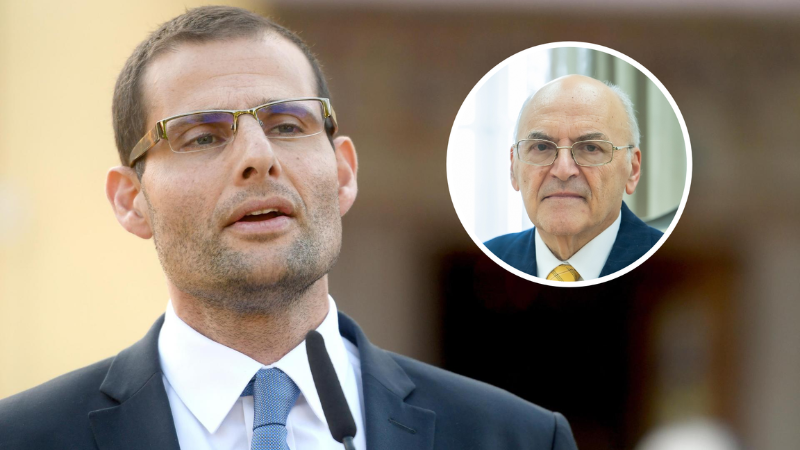
Standards Commissioner Joseph Azzopardi has decided not to pursue additional investigations into complaints against Prime Minister Robert Abela and several Cabinet members who failed to present their declarations of assets for the year 2023, due to the absence of a legal obligation.
However, the Standards Commissioner office said that the system surrounding the declaration of assets needs to be reformed, describing it as “deficient,” and urged Parliament and the government to implement a reform that improves transparency, accountability and public access.
In his report published on Friday, the Commissioner referred to the complaint made by ADPD deputy chairperson Carmel Cacopardo on 6 December 2024, who requested an investigation into the fact that the declarations of assets for the Prime Minister and Cabinet for the year 2023 had not been tabled in the House of Representatives.
In light of the complaint, the Office of the Commissioner wrote to the Cabinet Secretary and noted that the asset declarations of the ministers and parliamentary secretaries for the year 2023 were not accessible.
The same letter also requested information on whether the declarations had been tabled in Parliament, and if not, the reason for the delay and when they were expected to be tabled, the report said.
On 20 December 2024, the Cabinet Secretary replied via letter, saying that while the asset declarations for 2023 had been submitted to him by the end of March 2024 in line with the Code of Ethics for Ministers and Parliamentary Secretaries, as found in the Standards in Public Life Act and the Cabinet Manual, he was not aware of any further obligation on him arising from any law, code, or manual, the report said.
In the absence of more information, particularly a concrete response to the question regarding the publication of these declarations, on 2 January 2025, the office wrote to the Prime Minister notifying him of the complaint.
That letter referenced the Cabinet Secretary’s response and drew attention to the 2019 recommendation by the Group of States Against Corruption (GRECO), which stated that declarations should be made more easily and systematically accessible.
“In light of this Office’s role under Article 13(1)(a) of the Act, which includes examining declarations, including those of Ministers, this Office requested the government to indicate whether it would provide the declarations to the undersigned,” the report said.
The Commissioner said that during the preliminary investigation, the Office also noted that the subject of Cabinet asset declarations had been discussed publicly and had also been referred to in Parliament.
The report said that on 14 January 2025, PN MP Karol Aquilina posed a series of parliamentary questions to the Prime Minister, and to all Ministers and Parliamentary Secretaries, requesting that their asset declarations for 2023 be tabled.
It continued that on 20 January 2025, the Prime Minister replied to these parliamentary questions, saying that contrary to what was written in the Nationalist Party’s statement on this same issue, the Cabinet Procedures Manual states the following:
“Within two months of appointment and no later than the month of March each year, each Minister and Parliamentary Secretary must send the Cabinet Secretary a declaration of assets.”
The asset declarations of the Ministers and Parliamentary Secretaries for 2023 were submitted as required by the Manual, and were available to the public, he had replied.
The responses of all the Ministers and Parliamentary Secretaries are dated 20 or 21 January, and all refer only to the Prime Minister’s cited response, the report said.
Subsequently, on 21 January 2025, Aquilina requested a ruling from the Speaker of the House in light of the Prime Minister’s reply, seeking to oblige the Prime Minister and Ministers to table copies of their 2023 asset declarations in Parliament. The next day, the Speaker gave his ruling on the matter.
On 27 January 2025, the Prime Minister wrote to the Standards Commissioner’s Office, saying that he, the Ministers, the Parliamentary Secretaries, and PL MPs had all tabled their parliamentary declarations within the stipulated timeframe.
Regarding their declarations as Ministers, the Prime Minister referenced the Speaker’s ruling of 22 January, which held that there was no obligation for ministerial declarations to be tabled in Parliament, and that public accessibility is satisfied by a request made to the Cabinet Secretary.
The report said that the Prime Minister also expressed his opinion on the current system of asset declarations, stating that he believes it would be wise to have a single form filled out by all Members of Parliament without distinction.
He also requested the views of the Office on this point.
The Standards’ office felt it was appropriate to address the Prime Minister’s proposals and raise some points, including that whatever the future system of asset declarations may be, there should be no reduction in the information Ministers are obliged to provide.
Furthermore, the Office said that any change should be in line with the recommendations of the Organisation for Economic Co-operation and Development (OECD) and GRECO, and any reform to the system should follow public consultation and not be rushed.
He said that in the meantime, Ministers’ declarations for 2023 should be tabled.
The report said that in view of this Office’s function of verifying Ministers’ asset declarations, it should be granted access to such declarations through their tabling in Parliament.
“This Office should also be granted access to the tax declarations of all MPs, which are submitted to the Speaker in accordance with the Tax Administration Act and to which only MPs or newspaper editors currently have access – this is a legal anomaly that should be resolved,” the report said.
The Office noted that by the date of the referred correspondence, this Office had still not been granted access to or copies of the Ministerial declarations.
“Therefore, a formal request for the same declarations was again necessary,” the report said.
On 6 February, a report appeared in a local newspaper in which comments the Prime Minister made to several journalists regarding the ministerial asset declarations were reported.
Asked by a journalist about the publication of the ministerial declarations, the Prime Minister had said there is a procedure through which they are requested from the Cabinet Secretary. If such a request is made, it will then be considered.
He had also said that this separate asset declaration from that of Members of Parliament is done for the purpose of scrutiny by the Prime Minister of the Ministers and parliamentary secretaries, and nowhere does it say that it must be tabled in Parliament.
The Prime Minister had then said that he has followed precisely the procedures in the Cabinet Manual.
On 12 March 2025, the Office was provided with copies of the Ministerial asset declarations.
The Standards Commissioner referred to the Speaker’s ruling on the matter, which he had explained the current system for asset declarations and the legal basis that outlines how they should be submitted.
Speaker Anglu Farrugia had explained that ministers and parliamentary secretaries each year submit their declaration of assets to the Cabinet Secretary as members of Cabinet.
Separately, as members of Parliament, they also submit a different declaration to the Speaker of the House.
The ruling concluded that there is no legal or procedural obligation for the ministerial asset declarations to be tabled in Parliament, and therefore, there is no breach of parliamentary rules if they are not tabled.
“In view of the Speaker’s ruling, this Office considers that it is not in a position to recommend disciplinary action for failure to table the ministerial asset declarations in Parliament, since this was not required by any law or rule,” the report said.
“However, this Office is of the opinion that the current system of dual declarations, one as ministers and one as MPs, is unsatisfactory,” the Standards Commissioner said.
He said that the ministerial declarations are submitted to the Cabinet Secretary and not automatically made public, while the parliamentary declarations are tabled in the House and accessible to the public.
“This results in unnecessary duplication, confusion, and a lack of systematic transparency,” the Office said.
It said that GRECO’s 2019 recommendation clearly stated that asset declarations by ministers should be made more systematically and easily accessible to the public.
“The current system does not fulfil that recommendation, as confirmed in the most recent GRECO evaluation,” the report said.
The Office reiterated its recommendation that the system be reformed so that ministers and parliamentary secretaries submit only one declaration of assets, and that this declaration be public, detailed, and accessible, in line with GRECO and OECD recommendations.
The Office also recommended that these declarations be verified independently by an authority that has access to necessary tools such as tax records and land registries.
The Standards’ Office was pleased to note that the Prime Minister has already expressed agreement with the idea of reforming the system and has sought the views of this Office.
“However, the Office emphasizes that no reform should result in a reduction in the transparency or level of detail required in the current declarations. Reforms should be carried out after public consultation and not rushed,” it said.
In conclusion, although the complaint about the non-tabling of ministerial asset declarations was not upheld due to the absence of a legal obligation, the Office maintained that the system is deficient and urged Parliament and the government to implement reform that improves transparency, accountability, and public access.












